Mecklenburg County aims to have a zero-carbon fleet by 2030. Here’s how.
Last month we shared an update on how Mecklenburg County’s leaders are considering a plan to achieve a zero-carbon goal for County-owned facilities by 2030. Now we’re sharing how they plan to do the same for the County’s fleet of vehicles. The information and figures shown here were presented at the March 6 Board of County Commisioners (BOCC) Environmental Stewardship meeting.
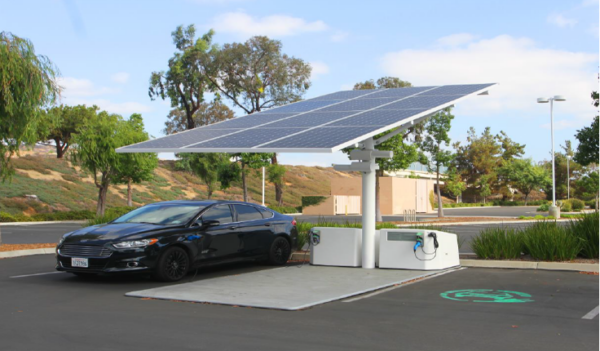
Solar-powered electric vehicle charging stations could help the County achieve a zero-carbon fleet.
By far, the largest source (86 percent) of greenhouse gas emissions from County operations occurs as a result of electricity and natural gas usage in buildings and facilities. As shown below, approximately 15 percent of emissions are caused by the use of fleet vehicles that run on gasoline and diesel.
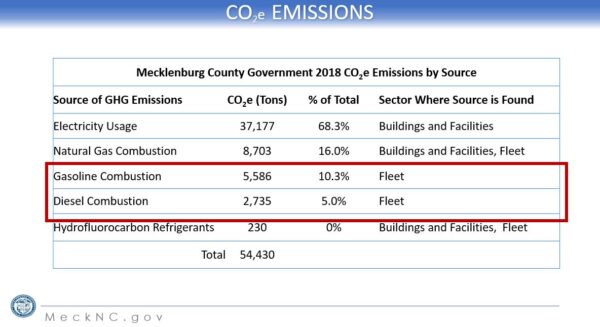
The County’s energy management staff have outlined a path forward to achieving a zero-carbon fleet by the year 2030. It’s important to note that this information was presented to the Environmental Stewardship Committee so they will be well informed to advise the full BOCC with a recommendation. Unlike the City of Charlotte, Mecklenburg County does not yet have a clean energy resolution or plan.
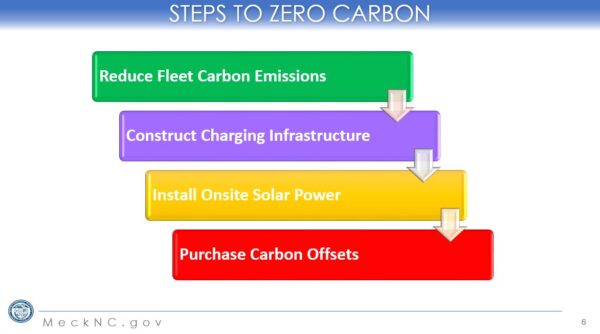
There are four proposed steps to achieve a zero-carbon County fleet by 2030. Here’s the “Fast Track Plan”:
1. Reduce Fleet Carbon Emissions
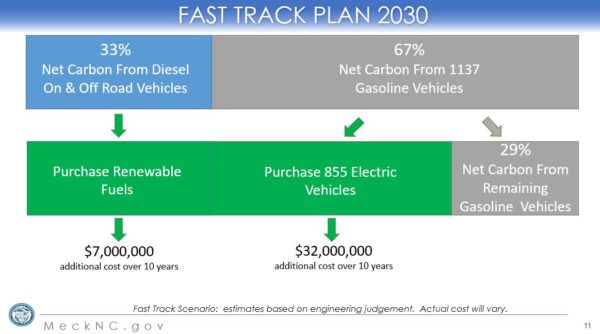
- Develop a sustainable fleet plan and update it annually
- Purchase renewable fuels where and when available
- Replace existing vehicles with hybrids and electric vehicles (Some vehicles like large cargo vans, large trucks, off road equipment and Sherriff vehicles would remain fuel powered through 2030 unless feasible alternatives become available.)
- Converting to electric vehicles eliminates all tailpipe emissions, including criteria pollutants that form ground-level ozone locally.
2. Construct Charging Infrastructure
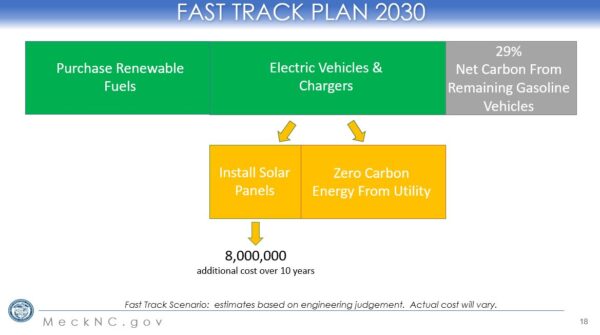
- Install level 1 & 2 chargers throughout County facilities
- Install level 3 chargers strategically to allow fast charging
- Consider allowing the public to use some of the chargers
- Develop policy and training for charging vehicles
3. Install Onsite Solar Power
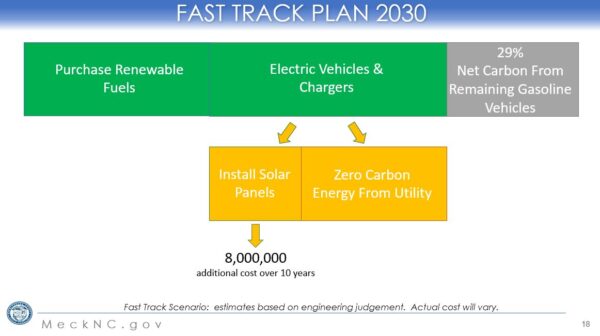
- Most of the electric power used by Mecklenburg County comes from Duke Energy
- Approximately 45% of Duke’s electricity is generated from a carbon source fuel
- This carbon would also need to be offset to get to net zero
- Solar power and batteries installed in parking lots for charging stations could offset this carbon
- There may not be a payback
4. Purchase Carbon Offsets
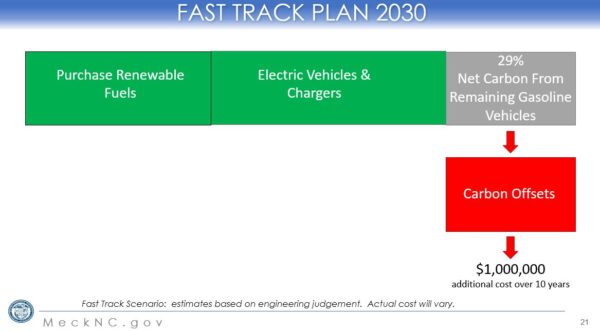
- Carbon Offsets and Renewable Energy Certificates (RECs) can be purchased to offset remaining carbon
- RECs are available on the open market and are sold in 1 MWh lots. Current cost varies from $0.70 – $5.00
- Not likely to reduce local emissions but does reduce global emissions and creates market incentives for renewable energy generation.
- Represents an investment in renewable energy
- RECs and Offsets are market-driven and may go up in cost
What will it cost?
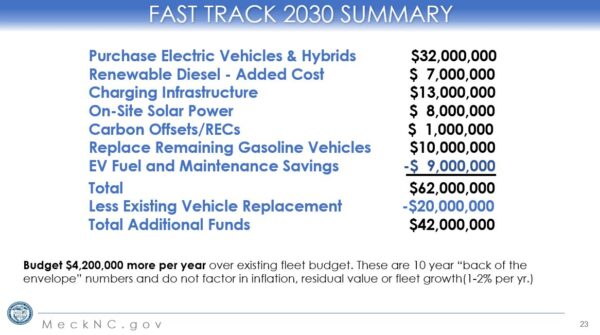
Every plan needs at least an estimated budget to fully understand the required investment. A 10-year implementation of the Fast Track plan to achieve a zero-carbon fleet using the strategy outlined above would cost an estimated additional $4.2 Million per year (over ten years) for the County’s annual fleet budget. The more that residents and municipalities embrace clean technologies, the more the price is likely to drop between now and 2030.
Given Mecklenburg County’s rapidly growing population and our current challenges with air quality, we see this as a very worthy investment that will allow our County’s leaders to not only protect the health of residents but also to take leadership on reducing Mecklenburg’s contributions to climate change.
The time to act is now!
Mecklenburg County’s air quality currently teeters on the brink of falling out of attainment standards for ground-level ozone, a dangerous pollutant that’s formed in our area primarily from vehicle tailpipe emissions. These standards are set to protect the health of our most vulnerable residents: children, the elderly, and people with chronic heart and lung conditions.
To add even more urgency to the need for local action, just yesterday President Donald Trump’s administration rolled back U.S. vehicle emissions standards that had been adopted under Barack Obama. At a time when millions of American lives are already at risk from the coronavirus pandemic, saving automakers money by weakening health-protecting air quality standards not only guts climate change goals, but also threatens our health and our household financial stability. This rollback of fuel efficiency and emissions standards will cause consumers who are already suffering record new unemployment to be further impacted as they end up buying about 80 billion more gallons of gas annually! Even models accepted by the administration predict that this change will result in more American lives lost to air pollution and an additional 1 billion tons of carbon emitted over the lifetime of the vehicles built under the relaxed standards.
While we will continue to assess this quickly-evolving situation and share opportunities to make a difference, we also need strong local leadership more than ever. Despite federal missteps, our County’s leaders can step up to the challenge. They can choose to protect the health of their constituents and the future of our children by moving towards a zero-carbon fleet.
View the presentation shown at the March 6 meeting here.
Thanks for reading!
As a nonprofit, community support is essential for us to keep doing what we do — including providing free articles like this. If you found this article helpful, please consider supporting Sustain Charlotte.
Want to stay in the loop? Subscribe to our weekly newsletter and follow us on Instagram, Facebook, and Twitter.
